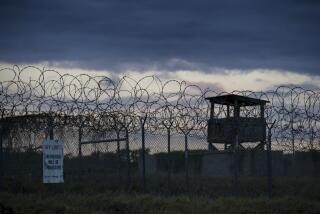Court blocked the release of Guantanamo detainee who died
The latest prisoner to die at the Guantanamo Bay detention facility for terrorism suspects was a young Yemeni imprisoned there for more than a decade despite a 2010 federal court order that he be freed and the military’s judgment three years earlier that he could be safely released.
Adnan Farhan Abdul Latif died at the Camp V maximum-security block of the U.S. military prison in southern Cuba on Saturday, Joint Task Force Guantanamo said in a statement Tuesday. The statement gave Latif’s age as 32, although reports from other sources said his birth date was Dec. 27, 1975.
The statement identifying the ninth Guantanamo prisoner to die since the detention center opened in January 2002 failed to specify a cause of death, saying autopsy results and death determinations “take time.”
But Latif’s pro bono lawyer, David H. Remes, told courts throughout the prisoner’s nearly 11-year imprisonment at Guantanamo that he suffered mental problems, was despondent over his indefinite detention and had repeatedly attempted suicide.
Latif was among the first prisoners brought to Guantanamo. He was handed over to U.S. forces by Pakistani security guards in the chaotic aftermath of the U.S. invasion of Afghanistan in October 2001.
The Pentagon concluded after Latif’s 2004 Combatant Status Review Tribunal that he had not participated in terrorist training and cleared him for release three years later, according to documents obtained and made public by the WikiLeaks website.
But like many of the more than 100 Yemenis at the prison at that time, he could not be sent back to his home country because of fears for his safety amid political turmoil and other nations declined to take him in.
Latif won his habeas corpus challenge in 2010, when U.S. District Judge Henry H. Kennedy Jr. rejected as insufficient the government’s grounds for keeping him imprisoned, arguments that were submitted under seal and blacked out in the court ruling ordering his release. The Justice Department appealed Kennedy’s ruling, arguing that officials needed more time to comply with the release order “without compromising the government’s sensitive national security and foreign policy concerns.”
A federal appeals court in Washington ruled 2-1 in favor of the government a year ago, saying Kennedy should have respected the government’s position. The U.S. Supreme Court declined to review the case, leaving Latif imprisoned without further recourse for challenging his indefinite detention.
An autopsy was conducted on Latif’s remains and an investigation is underway by the Naval Criminal Investigative Service, the military statement said.
There remain 167 foreign prisoners at Guantanamo, down from a peak of nearly 800 in 2005.
ALSO:
9/11 -- 11 years later: A nation pauses to mourn anew
Ice threat halts Shell’s drilling in Arctic Ocean after one day
Curiosity tests new camera, has nowhere to spend its penny
carol.williams@latimes.com
More to Read
Sign up for Essential California
The most important California stories and recommendations in your inbox every morning.
You may occasionally receive promotional content from the Los Angeles Times.











